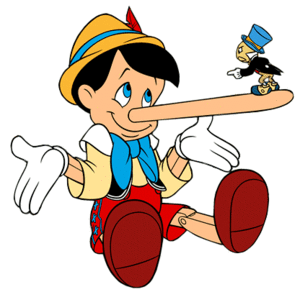 Please, please, please, let 2014 be the year of reason, of critical thinking and common sense.
Please, please, please, let 2014 be the year of reason, of critical thinking and common sense.
I don’t know who that was directed at in particular, whether it be an imaginary man in the sky, or my cat, but the sentiment seems to be one a good many people are expressing in their own way, in these early days of the new year.
2013 was a hallmark year for hoaxes, though that sort of depends on how you define hoax. A good many of the stories that circulated social networks last year fell under the general definition of hoax, but while erroneous and apparently maliciously false stories may seem more common now, in the information age, pulling the wool over people’s eyes is most definitely not a new thing.
From academia to popular culture, there is no shortage of people trying to get one over on the general public, and while a lengthy examination of the hundreds of hoaxes that have been pulled off over the years, some more successful than others, would be both interesting and entertaining, I want to take the time to look at the one aspect of the hoaxing trend that seems to defy definition: why?
 When you consider some classical hoaxes, from the Piltdown Man, or Orson Wells’ War of Worlds radio show, there seem to be obvious motivators that the perpetrators clung to in their planning and execution. Whether malicious in nature or purely innocent, these scenarios have typically been born of a desire to make the punch line stick. Of the two examples given above, whomever the hoaxer of the Piltdown bone fragments actually was, it seems clear that the intention was to ridicule and embarrass the paleontological scholars involved in examining the found materials. Orson Wells however, had innocent intentions; he simply wanted to entertain and, perhaps, took his good humour a little far (though some suggest that the real hoax is that the ensuing panic never actually happened, or is that yet another hoax?). In the end though, in both cases the purpose seems to have been to get a good laugh on the part of the hoaxer.
When you consider some classical hoaxes, from the Piltdown Man, or Orson Wells’ War of Worlds radio show, there seem to be obvious motivators that the perpetrators clung to in their planning and execution. Whether malicious in nature or purely innocent, these scenarios have typically been born of a desire to make the punch line stick. Of the two examples given above, whomever the hoaxer of the Piltdown bone fragments actually was, it seems clear that the intention was to ridicule and embarrass the paleontological scholars involved in examining the found materials. Orson Wells however, had innocent intentions; he simply wanted to entertain and, perhaps, took his good humour a little far (though some suggest that the real hoax is that the ensuing panic never actually happened, or is that yet another hoax?). In the end though, in both cases the purpose seems to have been to get a good laugh on the part of the hoaxer.
Perhaps it’s our distance from these hoaxes that makes them seem humorous or charming, but even more recent events have their charm, to a point.
 2009’s Balloon Boy hoax is a good example of a hoax that not only went too far, but also defies any attempt to reason through their motivations. Why do what they did? The obvious answer is to achieve that 15 minutes of fame to which we’re each entitled. But is that hollow recognition really the primary motivator for hoaxing?
2009’s Balloon Boy hoax is a good example of a hoax that not only went too far, but also defies any attempt to reason through their motivations. Why do what they did? The obvious answer is to achieve that 15 minutes of fame to which we’re each entitled. But is that hollow recognition really the primary motivator for hoaxing?
There is always, and probably always will be a financial aspect to this kind of trickery. Many modern day hoaxes are attached to marketing schemes and viral campaigns for popular media and movies, capitalizing on the public’s ever present appetite for scandal and gossip, but this isn’t always the case, is it?
Recently there have been a number of high profile hoaxes in the Fortean world, from cryptozoology to OOPARTS or, if I may coin a term, xenoarchaeology. I’ve covered a number of these stories in the past, from Melba Ketchum’s Bigfoot DNA debacle, to the Ted Litton / Megalograptus hoax, and there are more to come. One of the things that can be said about Ketchum, is that she really seems to believe her own BS, which may be a feature of her own deluded rationalizations, and when compared to say, Rick Dyer’s new Bigfoot body extravaganza, how much credit should we give these people for believing in, or feigning belief in their own stories?
Really though, this all boils down to lying. Why do we lie? Although the perpetrators of some or all of the hoaxes listed above might argue that they aren’t lying, I think we can all agree that hoaxes are really just the elaborate products of simple lies.
To answer that question – why do we lie? – one must first look at how prevalent lying really is in our society. According to a study published in the Journal of Basic and Applied Psychology by psychologist Robert Feldman of the University of Massachusetts, lying is a reflexive defense of our self-esteem.
“It’s tied in with self-esteem,” says Feldman. “We find that as soon as people feel that their self-esteem is threatened, they immediately begin to lie at higher levels.”
 Feldman says that in his study 60 percent of participants lied at least once during a 10 minute conversation. The majority of participants, denied having said anything untruthful, and were genuinely surprised when video footage was replayed. Feldman says that lying is, at this level, a subconscious reflex used to maintain self-esteem, not only from the perspective of others but from themselves as well.
Feldman says that in his study 60 percent of participants lied at least once during a 10 minute conversation. The majority of participants, denied having said anything untruthful, and were genuinely surprised when video footage was replayed. Feldman says that lying is, at this level, a subconscious reflex used to maintain self-esteem, not only from the perspective of others but from themselves as well.
So, we do it to make ourselves feel better about ourselves, and this would suggest that it is the result of feelings of inadequacy, both in our own eyes and in the eyes of others. This makes sense, at least as it relates to small, so-called white lies. Small untruths that have little impact on our lives or on the lives of those around us, but does the depth of the lie relate to the depth of inadequacy? It may to a point, but it seems that bigger lies are the result of a misjudgement of the likelihood that the liar will be caught.
University of New England’s associate professor of philosophy, David Smith PhD, says that lying is a perfectly natural part of human society, and that there are generally six reasons why people lie:
- To Save Face
- To Shift Blame
- To Avoid Confrontation
- To Get One’s Own way
- To Be Nice
- To Make One Feel Better About Themselves
So, where on this list would the hoaxer fit? With a good many hoaxes, there’s a certain level of anonymity at play. Many who perpetrate hoaxes are never exposed, and as such it’s unlikely that saving face or avoiding blame have any real impact on their motives. Depending on your view of the situation, it could be said that hoaxers are going out of their way to find confrontation, albeit in a detached manner, and they certainly seem to be getting their own way, though nice rarely has anything to do with it.
 Ultimately, from this list, it would have to be that they’re attempting to boost their own self-esteem, but I would suggest that this list is inadequate to answer our question. It certainly seems like, with most hoaxes, that the people involved are trying to bolster their own self-esteem by lording such falsities over the heads of the public, at least those in the public who entertain such things, so as to feel superior to those who weren’t capable of “seeing the truth” as it were. It seems more than a lie, it seems a manipulation of people’s beliefs and fears in some cases. It seems a feature of the anti-establishment movement and a method for pushing misinformation into the discussion for the purpose of derailing productive discourse. It seems political and self-serving and deleterious, and if we look at individual hoaxes, we can see elements of all of the above, but it doesn’t seem like any of them can be considered the one true culprit.
Ultimately, from this list, it would have to be that they’re attempting to boost their own self-esteem, but I would suggest that this list is inadequate to answer our question. It certainly seems like, with most hoaxes, that the people involved are trying to bolster their own self-esteem by lording such falsities over the heads of the public, at least those in the public who entertain such things, so as to feel superior to those who weren’t capable of “seeing the truth” as it were. It seems more than a lie, it seems a manipulation of people’s beliefs and fears in some cases. It seems a feature of the anti-establishment movement and a method for pushing misinformation into the discussion for the purpose of derailing productive discourse. It seems political and self-serving and deleterious, and if we look at individual hoaxes, we can see elements of all of the above, but it doesn’t seem like any of them can be considered the one true culprit.
Our society, that is the internet society we’ve built over the last two decades, has in it certain mechanisms for rewarding such conspiratorial behaviour. Why do they hoax? Because they can, and they can get away with it, even if people like me search them out and expose them, and there is a very specific reason for that:
“It’s easier to fool people than to convince them that they have been fooled.” ― Mark Twain
People in general are ready to believe, they are ready to accept that there is more to this world than meets the eye, and they actively seek out information that supports their desire to be mystified. In years past it was the side-show, the magician, the mesmerist who satisfied that craving, today it’s paranormal gurus, cryptozoologists and spiritualists who answer the call. The problem is that the boring establishment, the entity that most in the effected community feel the need to rebel against, has no position on such topics, beyond the accusation of pseudoscience. So those who provide answers, whether those answers are based in fact or not, are rewarded with adoration and fame, however undeserved it may be.
And so we’ve come full circle. Is it empty fame, money, or a boost to one’s self-esteem? I would say it’s all three, and a combination of all of the other factors discussed therein. The only weapon we have against it is an insatiable desire for truth – clean, bare truth – and the means to find it among the detritus. Those who wish to believe will continue to do so, and those who wish to exploit that belief will also go on with their hoaxes.
